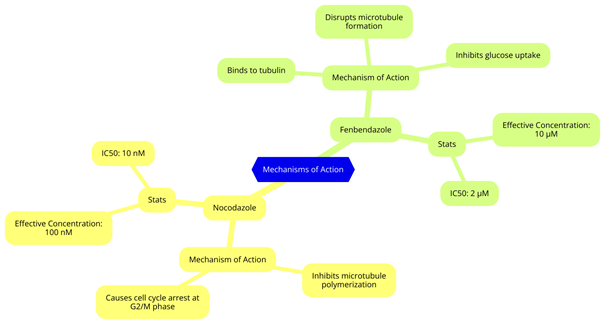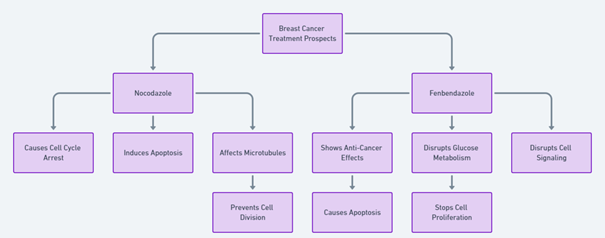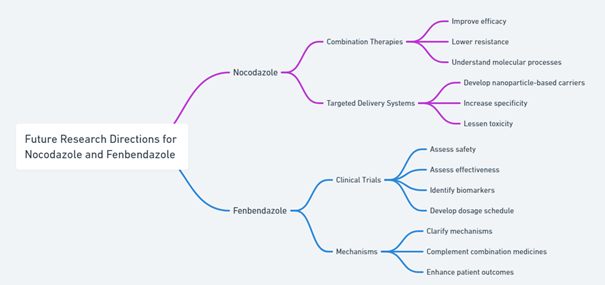Unconventional therapies have drawn a lot of interest in the always-changing field of cancer research. Created for unrelated uses, two such chemicals, Fenbendazole and Nocodazole, have shown possible anti-cancer effects. Their impact on human cells, their workings, and their developing applications in cancer therapy are all covered in this paper.
Clarifying Fenbendazole with Nocodazole
Nocodazole: Often employed in cell biology to disrupt microtubules and stop the cell cycle, nocodazole is a microtubule-depolymerizing chemical. Its principal use is in laboratory research, especially in the study of mitosis and cell cycle dynamics.
Fenbendazole: Animal parasite illnesses are the main usage for this benzimidazole anthelmintic. Fenbendazole is becoming a more and more interesting topic in oncological research because of recent studies that suggest it may also have anti-cancer effects.
Processes of Action
Nocodazole stops the cell cycle in the G2/M stage by interfering with microtubule polymerization. In quickly dividing cancer cells, this disruption prevents cell division and causes apoptosis or planned cell death. Because it can cause apoptosis and cell cycle arrest, it is an important tool in cancer research.
Fenbendazole: By attaching to tubulin, fenbendazole similarly affects microtubules, therefore upsetting the energy metabolism of cancer cells. For cancer cells, this causes apoptosis and cell cycle arrest. Furthermore adding to fenbendazole‘s anti-cancer action are its effects on glucose metabolism and its capacity to obstruct the signaling pathways of cancer cells.

Analytical Comparative: Impact of Fenbendazole vs Nocodazole on Human Cancer Cells
• Nocodazole: Research has demonstrated that cells given this drug show notable cell cycle arrest and decreased proliferation in several cancer cell lines, including breast and lung malignancies. The anti-cancer properties of the medication depend critically on its capacity to cause apoptosis and upset microtubules.
• Fenbendazole: Studies show that, in cancer cell lines, it greatly boosts cell death and suppresses cell multiplication. Its anti-cancer properties have been confirmed by research concentrating on lung cancer and other malignancies.
The G2/M phase of the cell cycle is arrested by nocodazole, which keeps cells from finishing mitosis. Its capacity to stop cancer cell proliferation and trigger apoptosis depends critically on this arrest.
• Fenbendazole: This drug arrests the cell cycle, much like Nocodazole. However, its special relationship to microtubules and glucose metabolism offers a complex strategy for limiting the proliferation of cancer cells.
Research and Open Access: There are a tonne of open access papers on sites like NCBI that represent the thorough study of both chemicals. This research shows their potential and opens the door for more research in cancer therapy.
Prospect for Cancer Treatment Breast Cancer
• Nocodazole: Nocodazole has been found to successfully cause cell cycle arrest and apoptosis in breast cancer cell lines. Because of how it affects microtubules, it prevents cell division, which makes it a strong candidate for more study in the treatment of breast cancer.
• Fenbendazole: Research suggests that this drug also shows strong anti-cancer effects against cells of breast cancer. Through disruption of glucose metabolism and cell signaling, fenbendazole can cause apoptosis and stop breast cancer cells from proliferating.

Cancer of the Lungs
• Nocodazole: This drug may be used therapeutically to treat lung cancer because it has been demonstrated in cell lines of the disease to inhibit cell proliferation and cause apoptosis.
• Fenbendazole: Likewise encouraging results are shown with fenbendazole on lung cancer cells. Its capacity to cause lung cancer cells to apoptosis and cell cycle arrest emphasizes its anti-cancer potential.
Getting Past Drug Resistance Drug resistance presents one of the main obstacles in the treatment of cancer.
This problem has shown promise to be overcome by both Fenbendazole and Nocodazole:
• Nocodazole: This medication works even in cancer cells resistant to other drugs by focusing on microtubules and arresting the cell cycle. • Fenbendazole: This medicine has a special mode of action that includes interfering with cell signaling and glucose metabolism, which makes it a possible treatment for tumors resistant to other drugs.

Detailed Mechanisms and New Directions in Research
Nocodazole :
• Microtubule Dynamics: Depolymerizing microtubules—which are essential for cell division—is the main way that nocodazole works. Nocodazole stops the synthesis of microtubules by attaching itself to tubulin, therefore inhibiting the development of mitotic spindles. Apoptosis results from this disturbance stopping, cell division at the mitotic phase.
Nocodazole also modifies several cell signaling pathways. It can change how well proteins like p53 and cyclin-dependent kinases (CDKs) regulate the cell cycle function. These modifications improve even more its capacity to cause cancer cells to halt their cell cycle and commit suicide.
• Synergistic Effects: Nocodazole has been proven in research to increase the effectiveness of other chemotherapy drugs by acting in concert with them. Especially noteworthy is this synergism in conjunction with medications that target DNA replication and repair.
Fenbendazole:
• Metabolic Interference: By affecting cancer cells’ metabolism—more especially, their glucose metabolism—fenbendazole has an influence. Because fenbendazole deprives cancer cells of glucose, which they need for development and energy, the cells die.
• Reactive oxygen species (ROS) produced by fenbendazole cause a stress response in cancer cells. Oxidative stress brought on by raised ROS levels damages cellular components and results in apoptosis.
• Induction of Autophagy: According to new research, fenbendazole may also cause autophagy, a stress-related process in which cells break down their parts. Fenbendazole overly activating this mechanism in cancer cells can result in cell death.
Clinical Research & Case Studies

The Nocodazole Clinical Evidence
• In Vivo Studies: Nocodazole has been shown in animal models to shrink tumor size and slow down tumor development. A basis is laid by these investigations for possible human therapeutic trials.
Human Trials: Though mostly used in research settings, there is increasing interest in starting clinical trials to assess the safety and effectiveness of nocodazole in cancer patients. Early research indicates that it may be especially beneficial for malignancies with high mitotic rates, such as some forms of lymphoma and leukemia.
Clinical Fenbendazole Evidence
• Case Reports: After taking fenbendazole on their own, cancer patients—especially those with fatal diagnoses—have reported cases of tumor shrinkage and better results. Formal clinical studies are now of interest because of these reports.
• Preclinical investigations: Effective inhibition of tumor growth and induction of apoptosis has been demonstrated by fenbendazole in laboratory investigations on animal models and cancer cell lines. The encouraging outcomes have prompted calls for larger clinical studies to evaluate its efficacy as a cancer therapy.
Safety Issues and Ethics
Aspects of Ethics
• Off-Label Use: There are moral questions raised by the use of Fenbendazole and Nocodazole in cancer therapy, especially when off-label use is done without enough clinical data. To guarantee safety and efficacy, patients and healthcare professionals must depend on medicines that have been verified by science and take part in well-planned clinical trials.
• Informed Consent: Informed consent is required for any use off-label or for taking part in research therapies. Patients have to be well aware of the possible advantages, disadvantages, and unknowns related to these therapies.
Matters of Safety
• Nocodazole: Known to have cytotoxic effects, if not closely watched, it can have serious side effects. Possible side effects include neurotoxicity, gastrointestinal problems, and myelosuppression.
• Fenbendazole: While thought safe for usage in animals, nothing is known about its long-term consequences and safety profile in humans. Hepatotoxicity and gastrointestinal problems are two such possible hazards.
Nocodazole Research Future Directions:
• Combination Therapies: To improve its efficacy and lower resistance, future research may concentrate on combining Nocodazole with other focused treatments. Better combination regimens can be designed with the help of knowledge of the molecular processes behind resistance to nocodazole.
• Targeted Delivery Systems: By developing carriers based on nanoparticles, one may increase the specificity and lessen the toxicity of nocodazole, hence increasing its viability as a cancer treatment.
Fenbendazole Research Future Directions
Clinical Trials: Clinical trials must be started to assess the safety and effectiveness of fenbendazole in cancer patients. The goals of these studies ought to be to find possible biomarkers for response and to develop a suitable dosage schedule.
Mechanisms: More research is required to clarify the precise processes by which fenbendazole works to prevent cancer. Complementing combination medicines with a knowledge of these pathways can enhance patient outcomes.

Verdict
Investigating Nocodazole and Fenbendazole as possible cancer treatments emphasizes the creative and occasionally nontraditional approaches used in the battle against cancer. Both medications have potential, but clinical use of them needs to be done carefully to guarantee that therapies are supported by strong scientific data and carried out by moral medical practice.
Strong anti-cancer properties of nocodazole are demonstrated via the disruption of microtubules. It has promise for combination treatments and focused delivery methods.
Needs to be rigorously clinically evaluated for effectiveness and safety.
Fenbendazole raises significant ethical and safety concerns for off-label usage; it shows promising anti-cancer action by interrupting metabolic pathways and triggering apoptosis; it requires extensive clinical trials to demonstrate its function in cancer treatment.
We can open up new therapeutic options for cancer by carrying out more study and understanding of these substances, giving patients hope and progressing the area of oncology.
References:
- “Mechanisms of Nocodazole-induced apoptosis in cancer cells.” Molecular Cancer Research. Retrieved from NCBI.
- “The anti-cancer potential of Fenbendazole: An overview.” Journal of Experimental Cancer Research. Retrieved from NCBI.
- “Nocodazole and Fenbendazole: Emerging roles in cancer therapy.” Cancer Treatment Reviews. Retrieved from NCBI.
- “Nocodazole induces apoptosis and cell cycle arrest in cancer cells.” Journal of Cell Biology. Retrieved from NCBI.







2 Comments
It is really a nice and helpful piece of information. I am happy
that you shared this helpful info with us. Please stay us up to date like this.
Thank you for sharing. https://Odessaforum.biz.ua/
Glad you enjoyed the blog articles, I hope they helped you in some way. Thank you.